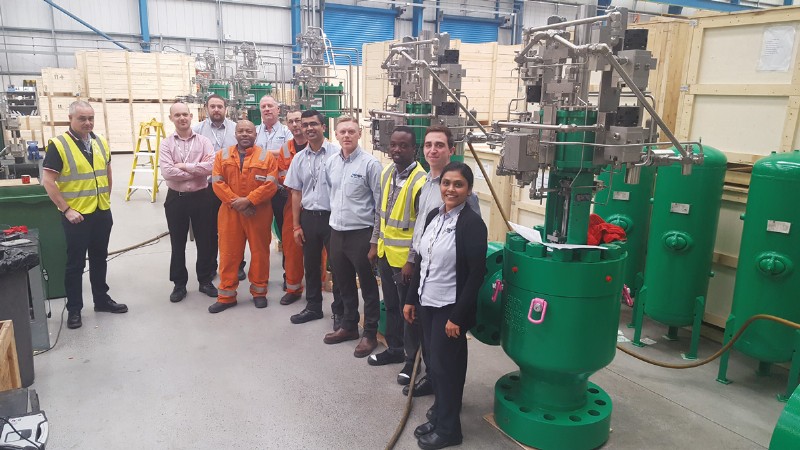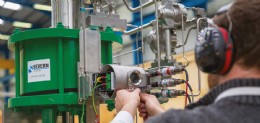Engineer-to-engineer collaboration conquers extreme FPSO valve issues
An FPSO off the African coast was experiencing valve-related performance issues that interrupted production, resulting in significant financial loss.


The challenge
Process demands for FVs on FPSOs are rigorous. Yet their specification does not always marry up with the conditions encountered once they are in operation. Over time, this can result in valve damage, leading to serious performance issues that pose a risk to safety and production.
Severn was tasked with improving the durability and performance of FVs in an FPSO application that required reliable, controlled handling of an extreme pressure drop from 400 Bar to atmosphere.
The valves were originally specified for manufacture in carbon steel. However, this material was unable to withstand the environmental conditions associated with seawater, exposure to oxygen and high air temperatures. The FVs suffered significant corrosion to the outlet and the underside of the bonnet. Consequently, they experienced internal leakage and the multi-stage pressure drop designed into the valve trim became a poorly controlled onestage drop, resulting in excessive fluid velocities and significant cavitation. Thickness of the FV outlet walls also deteriorated rapidly, falling from around 89mm to 20mm in localised areas, in just six months.
A technical solution was needed to overcome these problems, without incurring disproportionate costs.
The solution
Phase 1
Severn inspected the damaged FVs and ascertained that while carbon steel was adequate for the vessel’s upstream applications, downstream contact with warm, aerated seawater was too much for it to handle. Three alternative material solutions were proposed:
• Solid Inconel
• Inconel cladding on carbon steel
• Fibreglass resin coating on carbon steel
The least costly option, fibreglass resin coating, was selected by the operator. However, this only proved effective in the short term. After 12 months, problems associated with erosion, and subsequently corrosion, returned. At this point, Inconel cladding was deployed, and the valves remain in operation today, nearly five years later.
Phase 2
Sometime later, the FPSO began experiencing production challenges associated with assets outside the valve population. An oil and gas consultancy was appointed to develop a strategy to overcome these issues. The team reached out to Severn, beginning a collaborative process that would significantly enhance the vessel’s technical capabilities, to improve safety, reliability and performance.
Severn shared Repair IntelligenceTM insights derived from in-depth inspection reports conducted previously, along with technical recommendations to improve FVs on the FPSO. These were overlaid with precise vessel-wide performance information and process insights obtained by the consultancy. This updated information on process conditions resulted in prescribed operational requirements being adapted, and the valve specification was revised accordingly. The outcome is an intelligently engineered, cost-effective valve solution precisely tailored to the performance requirements of this vessel.
Material selection
Initially, the process temperature was specified as 60°C, but the new information confirmed that it was in fact 40°C, with alerts activated if it reached 50°C. This revision enabled alternative materials to be considered. Super Duplex had previously been disregarded because its corrosion resistance is compromised at 60°C, however it was an appropriate choice for the revised temperatures. As Super Duplex is more cost-effective than Inconel, it was feasible to manufacture the valves with solid Super Duplex bodies and bonnets. Potential galvanic corrosion between the carbon steel pipes and Super Duplex valves was avoided using customised flange insulation kits.
Valve control
At the outset, the valves had no specified stroke speed or control considerations such as deadband, dead time or repeatability. The new recommendation was to have specific stroke, dead time and deadband, limits which met the operator’s redundancy requirements for the instrument control components.
Previously, larger actuators were deployed. However, changes to the valve trim design resulted in a reduction of the upward thrust acting on the stem. This enabled use of smaller actuators, giving faster stroke speeds and more precise control.
A complex arrangement of air volume boosters, pilot-operated spool valves, air regulators and a volume/accumulator tank gives precise control with complete inbuilt redundancy. Since only one side of the system operates at a given time, if a component fails, the alternative side can be used with no impact on production.
The outcome
Collaboration between engineers at the operator, the consultancy and Severn has facilitated the design and manufacture of sophisticated valve technologies to handle the specific demands of the vessel.
All pressure control valves and flow control valves will be switched for highly-engineered Severn replacements during a planned shutdown. The valves were completed and shipped four weeks ahead of schedule. Severn-trained personnel at local partner organisation Genesis SG will support the commissioning process as well as ongoing maintenance, repair and operations (MRO) requirements.
Meanwhile, the Inconel-clad FVs supplied by Severn in 2013 will be overhauled, upgraded and retained as spares.
Tel: +44 (0)845 223 2040
Email: sales@severnglocon.co.uk
Web: www.severnglocon.com

| Telephone: | 0845 6070 710 |
| Email: | sales@severnvalve.com |
| Website: | www.severnvalve.com |
| More information on the Severn Glocon UK Valves Ltd BVAA Member Directory Page |
Search related valve / actuator articles: Severn Glocon UK Valves LtdIssue 42ValvesControl ValvesRepair and ServiceValve Repair and ServiceMisc. Company NewsR&DCompany News







-web.jpg)





